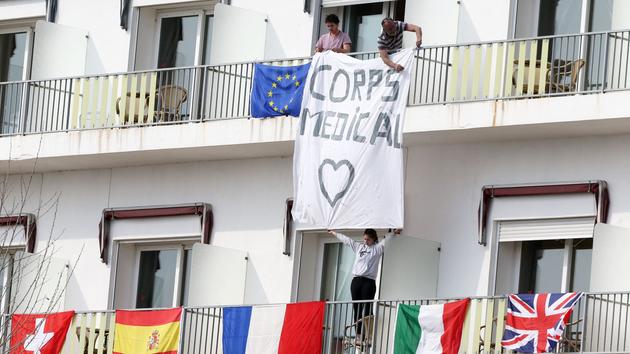The opinions of the major G7 powers, affected at various stages by the coronavirus pandemic, have so far shown some resilience. A Kantar survey (*), carried out between March 19 and 21 in Canada, France, Germany, Italy, Japan, the United Kingdom and the United States shows that the measures taken to contain the virus are there well or fairly well understood by 90% of the population.
Read also: Coronavirus: more than 1.7 billion people confined to the world
This result is all the more remarkable since some of these democracies have instituted containment measures which imply temporarily renouncing certain fundamental freedoms. This has been the case for Italy since March 11, France since March 17, the United Kingdom since Monday and 17 of the 50 American states. "These results show to what extent opinions have integrated the health and economic threat that weighs on them - to the point of making sacrifices which, in normal times, would seem unthinkable to them," observes Emmanuel Rivière, director of the Public division. at the Kantar Institute.
Relative cohesion
The respondents, logically worried about their health (73%) and that of their fellow citizens (86%), as well as for the development of their income (71%) or the education of their children (64% and up to 72% in France), say they trust the authorities of their country to get through the crisis. With the exception of Japan, which deplores "only" 1,128 cases and 42 deaths, but where only 35% of those questioned declare themselves satisfied, they largely approve the response from the public authorities. This is the case for 61% of French people - not quite a plebiscite in wartime - and 76% of Italians, despite the heavy toll on the peninsula.
More than nine out of ten Italians consider that measures of "social distancing", the closing of shops, schools and the ban on traveling are effectiveWith 63,000 cases identified and more than 6,000 dead, Italy is the country hardest hit by the Covid-19. More than nine out of ten Italians consider that measures of "social distancing", the closing of shops, schools and the ban on traveling are effective in stopping the epidemic. In the United States, where Donald Trump first underestimated the gravity of the situation, the approval index for the authorities' response is 53%. In Canada, it peaks at 66%.
This relative cohesion in the face of the pandemic does not exclude, here and there, criticisms. In France, where Emmanuel Macron's martial rhetoric on the evening of March 16 clearly aimed to provoke a form of sacred union, only 33% of those surveyed consider that public services are very or fairly well prepared to deal with it. It is 9% less than in Italy, and twice less than in Canada.
The French consider with particular severity the attitude of their fellow citizens. Only 36% of them rate it very or fairly goodThe shortage of masks in hospitals, as well as the lack of reagents for performing large-scale tests, undoubtedly explain this appreciation. Just like the reversals of experts and certain representatives of the government, who started by putting the danger of the virus into perspective before reviewing their analysis in the face of the foreseeable worsening of the balance sheet. "In a more general way, contextualizes Emmanuel Rivière , we have noted for several months that the French have been worried about what they perceive as underfunding in the hospital sector."
In some countries, a relative majority of respondents added that the measures taken did not go far enough. This is the case in Germany (47%), where the authorities have so far refused to consider the containment of their population, but also in France (49%). The French consider with particular severity the attitude of their fellow citizens. Only 36% of them rate it very or fairly good.
Read also: French people still carefree
Perhaps the images broadcast on the evening of Sunday, March 15, on which we discovered that thousands of Parisians had taken advantage of the sunny day to invest the markets, the parks and the quays of the Canal Saint-Martin despite the calls to " social distancing ”, they explain this figure. Unless it's theft of masks found in some hospitals ...
Assault of generosity
As a sign of the times, a third of those questioned indicate that they trust television first when they want to learn about the coronavirus. Doctors and health professionals only come second, far ahead of politicians.
A third of French people, questioned on the management of the crisis by the government, believes that it puts too much emphasis on the economy and by enough on health protection - while 45% consider this policy balanced. This concern is expressed in similar proportions in the United Kingdom and the United States, where travel restrictions still seemed only a distant hypothesis when the survey was carried out.
60% of Italians consider international cooperation in the fight against the epidemic to be quite bad and 67% say they are dissatisfied with European mutual aidFrance (91%) and Italy (94%), where life has frozen, are the countries that most readily adhere to containment measures. These data echo the success of the “stay at home” calls, as well as applauding the doctors every night from their balcony, launched on social networks. "Neither the impossibility of meeting, nor the prohibition to organize the burial of a loved one taken away by the coronavirus do not seem to threaten the adhesion to the imposed measures , analyzes Emmanuel Rivière. As if those polled had chosen to temporarily put their disagreements on hold - which will probably not prevent them from re-emerging once we are out of the crisis. ”
Right now, 60% of Italians consider international cooperation in the fight against the epidemic to be quite bad and 67% say they are dissatisfied with European mutual aid. On Monday, for the first time since the start of the crisis, Germany committed to welcoming 8 Italian patients with Covid-19 to its hospitals. Two from Bergamo have already been transported to Dresden and Leipzig. "This is a very important signal that we can help others too," said Minister-President (CDU) of Saxony Michael Kretschmer.
Read also: Coronavirus: Europe promises a “limitless” and “united” response
But this symbolic gesture will probably not be enough to make us forget that the EU, ill-prepared and poorly equipped, has so far been hardly able to help Italy. Last week, to make matters worse, we learned that a shipment of 110,000 masks and respirators intended for hospitals in Lombardy had been stolen in the Czech Republic. China, by contrast, but also Russia and Cuba have taken on generosity…
(*) Survey carried out by the Kantar Institute between March 19 and March 21, 2020 among 7005 representative people aged 16 and over, according to the quota method and stratification by region.







